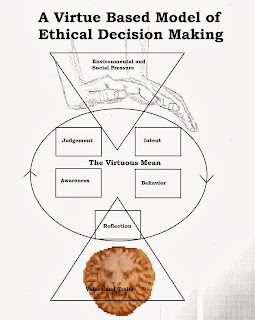Businesses have a
crisis in leadership that has been brewing over a few decades. A paper by
Crossman, et. al. (2013) delves into the need to develop character and values
in business education in order to provide future leaders guidelines for
appropriate behavior. From ethical crisis ranging from Lehman Brothers to Enron
the business community has important functions in society that also include
setting a standard of behavior.
According to the authors there has been movement on
the ethical side of educating business students since major scandals have
damaged the country. Yet the movement has not delved deep enough into how
students learn about ethics and develop character. To help them identify what their values are it
helps in identifying their moral compass through difficult situations.
According to (Peterson &
Seligman, 2004) an analysis of cultures, religion, moral philosophers and
others have revealed some universal values:
Wisdom: The cognitive
ability to be creative, love of learning, judgment, curiosity, and perspective.
Courage: Emotional
strengths to accomplish goals in the face of resistance that include bravery,
perseverance, honesty and zest.
Humanity: The
interpersonal skills that include love, kindness and social intelligence.
Justice: Community
strengths that strengthen society through teamwork, fairness, and leadership.
Temperance: The skills to
avoid excess through forgiveness, humility, prudence, self-regulation.
Transcendence: The strengths
that connect to a larger universe that includes appreciation of beauty and
excellence, gratitude, hope, humor, spirituality.
Certain teaching methods have
formed successful values through moral awareness. These include role-playing,
collaborative learning, self-reflection, and service learning (Comer &
Vega, 2008). It is through the fostering
of a greater understanding of society, working with others, and understanding
the self that moral fiber is flexed and grown.
Character is something that is in
our core, based within deep seated values. As difficult situations become
apparent there is a blending of the situation with our personal values. It is
also believed that situations often override character in most cases unless
there are clear values that are being violated. That is assuming the person made
the distinction. In situations where strong values have developed, character
may supersede the situation itself.
There will always be those beyond
the reach of ethical decision making. Business students who feel that earning
the most money regardless of costs on others or those in excessive need of
social approval that always follow the pack are likely to have an ethical
malfunction in difficult situations. Despite this, there are others, with proper
character training can overcome multiple pressures. To teach the standard sets
the expectations for students to reach and may become relevant in their
careers.
The authors argue that teaching
ethics and moral character in a class is beneficial. It helps students
understand moral dilemmas and learn how to reflect on the issues. A greater
solidification of the student’s values can help them draw upon those values
when the time is needed.
The report brings forward some important
concepts. A class on ethics and moral reasoning is beneficial for moral
development but is limited. Infusion throughout courses would appear to be the
best approach as it becomes laced with other concepts within memory. When moral
dilemmas arise and people seek answers they often look for examples and being
able to find these important examples through multiple pathways furthers the
potential draw and ethical conclusion. The values taught should be universal to
cultures, religions and peoples to make them most applicable whereby students
can build off the basics in any way they see fit to create personalization of
character.
Crossman, M. et. al. (2013).
Developing leadership character in business programs. Academy of Management Learning & Education, 12 (2).
Peterson, C., & Seligman, M.
E. P. 2004. The VIA Classification of Character Strengths. Retrieved from http://www.viacharacter.org/www/en-us/viainstitute/classification.aspx
Comer, D. R., & Vega, G.
2008. Using the PET assessment instrument to help students identify factors
that could impede moral behavior. Journal
of Business Ethics, 77: 129–145.
